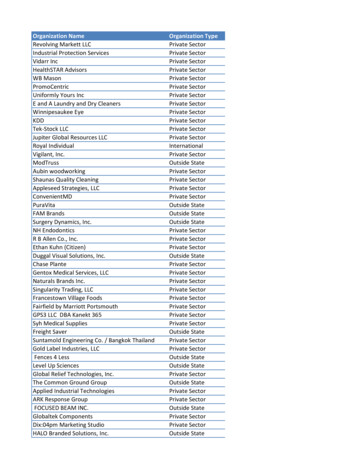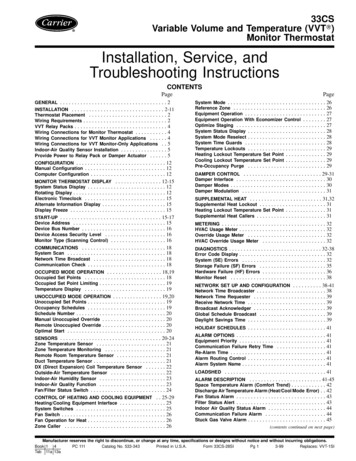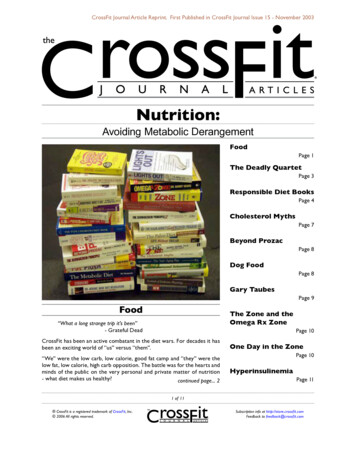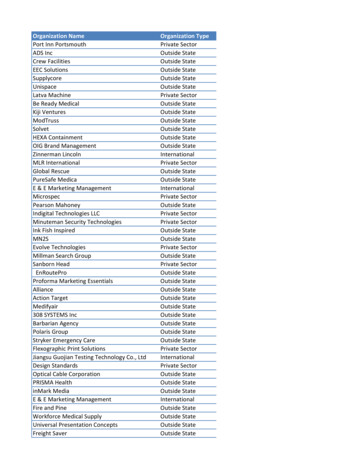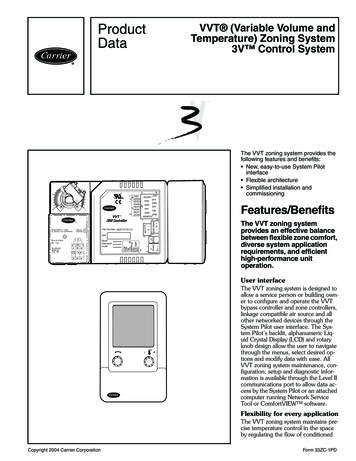
Transcription
Outside the Zone:A Bible Study Focused On Stepping Outside OurComfort Zones to Be Used of GodRachel WojnarowskiCopyright 2013 by Rachel WojnarowskiAll Rights Reserved, including the right toreproduce this book or portions thereof in anyform whatsoever.E-book Edition June 2013Cover Design by RachelWojo.com
IntroductionChapter 1: Outside the Zone of Appearance: David,Part 1Chapter 2: Outside the Zone of Appearance: David,Part 2Chapter 3: Outside the Zone of Appeal: Moses,Part 1Chapter 4: Outside the Zone of Ability: Moses,Part 2Chapter 5: Outside the Zone of Ancestry: GideonChapter 6: Outside the Zone of Adversity: NoahChapter 7: Outside the Zone of Age: SarahBonusAbout the Author
IntroductionBeing “in the zone” is usually the goal.Basketball- you want to make the baskets.Baseball- get it in the strike zone. Volleyball- insidethe lines. Soccer- kick it in the goal. I love sportsand I’m all about the rules. For a minute, indulgeme.As Christians, suppose that God wants to use you“outside the zone?” He has given you a unique setof talents and you are 100% about using thosetalents for Him. Awesome. But what if He is callingyou to do something that feels over the edge? Inother words, you may not be "loving it.”What if “it” is helping a stranger?What if “it” is telling a family member about whatChrist has done in your life this week?What if “it” is listening to the Holy Spirit as Heprompts you and acting on that prompt?What if “it” means you have to step outside yourcomfort zone and let God work through you?What if “it” means that you won’t be given anycredit for your talent?
What if “it” means people may think you are crazy?Think about this:Mark 12:43, 44“Calling his disciples to him, Jesus said, “I tell youthe truth, this poor widow has put more into thetreasury than all the others. They all gave out oftheir wealth; but she, out of her poverty, put ineverything-all she had to live on.”God has given each of us a unique set of talentsand gifts. Our personalities, family backgrounds,and experiences all contribute to the way Godwants to use us. But what if He is calling you to dosomething that is simply not a part of your comfortzone?What a character we find in Moses, the leader ofthe children of Israel. God spoke specificinstructions to him from the burning bush andMoses’ response was: “Who am I?” In other words,“God, what are you thinking? Do you really knowmy history? I mean, I killed a man out of anger. I’vebeen labeled a traitor and rebel ” Moses seemedto forget his miraculous beginning; that in an era ofthe decree to kill all baby boys under the age oftwo, he was saved from immediate death.To answer Moses’ question, “Who am I?”
“Oh, only that baby who was ingeniously disguisedas being ‘thrown into the river.’ That was nothingspecial. Oh, and the princess just happened to findyou and take you to safety. And then there is thatlittle matter of your sister volunteering your birthmother to be your nurse, but that was no big deal.”Yet we often approach God with that samequestion and attitude behind it. We make excusesthat are illegitimate. We state reasons that arecompletely full of logic and completely empty offaith in God.So who are you?The child of the King.All Christians have a comfort zone. Whether werealize or not, we have these certain areas we are“called” to serve in. We’ve been “gifted” aparticular way and God does that! But . truthfully,we use that so many times as a limit on how far wewill allow God to work in our lives. If anopportunity arises that is “outside of our comfortzone,” then we bypass.There is always someone better to do the job.Someone more equipped.Someone more knowledgeable.
Someone who looks like they fit the part.Someone whose parents possess that quality.Someone who is at that particular life stage.Does it matter that the Holy Spirit spoke to ourhearts about doing it? Does it matter that God putthe idea in our minds to pursue?When faith steps in, comfortable is no longercomforting.One definition of “comfort zone” is a comfortableplace where self-imposed boundaries define ourthoughts and actions. The boundaries can bephysical, mental, emotional or spiritual. The focusof this study is to journey outside our spiritualcomfort zones.In Heb. 11:1, “ Faith is the evidence of things notseen ” and Luke 1:37 ,”For with God, nothing isimpossible”, we begin to Biblically view the realmiracle of faith God wants to provide His childrenwhen they step outside their comfort zones andtrust Him fully. Each and every day, God calls us tostep out in faith and passionately pursue Him,regardless of our comfort level.In Matthew 9:20-22, the woman with the issue ofblood is a great example of stepping out infaith. She had obstacles, but overlooked
them. She could have made excuses, but chose tosquelch them. Her faith was her sole focus and shewas made whole. Her example should beinspiration for us!As we begin to further study Bible characters whotravelled “outside their zone,” consider thequestions we will answer:What do I do when I think “I don’t look the part?”What do I do when I think “I don’t have that type ofpersonality?”What do I do when I think “I’m not gifted in thatarea?”What do I do when I think “My family doesn’t workthat way?”What do I do when I think “No one will believeme?”What do I do when I think, “I’m at a different stageof life?”Do any of these sound familiar?“If we’re growing, we’re always going to beoutside our comfort zone.” – John MaxwellSo: want to be “in the zone” or “outside the zone?”
Notes:Introduction to the Study1. What is a comfort zone? What does theterm mean to you?2. “Comfort zone”: aplace where self-imposed boundariesdefine our and. The boundaries canbe , ,, or.3. The focus of this study is going outside ourcomfort zone.Rev. 3:164. The purpose of this study is to Biblicallythe real miracle of faith Godwants to provide His children when theystep their comfortzones and trust Him fully. Heb. 11:1; Luke1:375. Each day God calls us to step out in faithand pursue Him,regardless of our level.
6. The woman with the issue of bloodout in faith.She didn’t need to Him.She didn’t need to to Him.Complete the following outline using the titlepage and chapter headings:Bible Characters Who Went “Outside the Zone”1. Outside the Zone of : DavidI Samuel 16:1-13What to do when we think: “Ithe part.”2. Outside the Zone of : Moses, Part IExodus 3 & 4What to do when we think: “I don’t have thattype of .”3. Outside the Zone of :Moses, Part IIExodus 3 & 4What to do when we think: “I’m notin that area.”
4. Outside the Zone of :GideonJudges 6What to do when we think: “My family doesn’tthat way.”5. Outside the Zone of : NoahGenesis 6-9What to do when we think: “No one willme.”6. Outside the Zone of : SarahGenesis 17&18What to do when we think: “I’m at a differentstage in .”“If we’re , we’re always goingto be our.”John Maxwell
Looking ForwardOutside the Zone of Appearance : DavidRead I Samuel 16:1-131. Why did God send Samuel to Bethlehem?2. What characteristics did the Lord tellSamuel specifically NOT to look for?3. Why do you think that it is so difficult not tojudge a person by their appearance?4. Is there a particular verse in this passagethat stands out to you?As we look forward to studying David, his comfortzone, and his faith, think about the reasonsChristians use their own appearance in avoidingGod’s instruction. Then think about the reasonsChristians use the appearance of other people toavoid doing what God would have them to do.Read II Chronicles 19:4-91. When Jehoshaphat set up the judges in theland, what did he tell them to be careful todo?2. What were the three items Jehoshaphattold the judges would not be tolerated? (v.7)3. What were the two items he told the judgesWOULD be required? (v.9)
Personalizing the Lesson:Can you remember a time when you have not donesomething you felt the Lord desired because ofhow you look? David didn’t look the part and yetGod gave him the position of King.Do you recognize the times you have judged othersfor their appearance and perhaps missed anopportunity to be used of God as a result?How does our Heavenly Father see us and what isHe looking for in His children?
Chapter 1: Outside the Comfort Zone ofAppearance: David, Part 1I Samuel 16:1-13When men and women of the Bible allowedthemselves to go outside of their comfort zones,then the Lord received the most glory. Why?Because of the obvious evidence that only by HIMcould such incredible transformation take place.David had the lowest beginnings of just aboutanyone in the Bible. As a shepherd, he wasconsidered as a servant. Yet Samuel was sent byGod to anoint a king from the house of Jesse toreplace Saul. Two criteria God specifically negatedfor Samuel's choice: countenance and height. Verseseven of this passage in I Samuel explains thereason for this:God doesn’t see as man sees; God looks on theheart.David didn’t look the part; and in fact, after all thesons of Jesse had been reviewed by Samuel, he wasleft asking, “Got any more kids? Cause none ofthese fit the bill.” David was then summoned fromthe sheepfold.Step one to going “Outside the Zone”, thatcomfortable place where we create the boundaries
and limit our faith in God, is to stop formingconclusions based on the visual sense.What you see is not always what you get.A wonderful Christian lady I admire, Gail Hyatt,posted this picture several years ago.Photos used by permissionThis was her attempt at making a from-scratchcaramel frosting that was an heirloom recipe fromher husband’s family. I just love her authenticity.
Here is a second picture Gail posted:You see, the experience and taste of the cakecompletely outweighed its appearance.What is God calling us to look past? To fullyignore? To make invisible?Pointblank honesty here. Does your list ofconvictions include: tatoos, skin color, physicalscars, emotional scars, designer labels, poverty,wealth, hairstyles, piercings And the list could goon. Be honest; you have your list. Those thingsyou judge yourself for or others on withoutthinking, without extending grace.How do we look on the heart as God does? Howdo we get past the comfort zone of our ownappearance? How do we get past the physical
appearance of others and peer into the heart oftheir souls?By having our own hearts perfect toward the Lord.God wants us to see as He sees; He wants us to beso close to Him that we are continually looking athearts, lives, and souls.He wants us to step outside the comfort zone ofappearance and see ourselves and others as Hesees us.Part 2 will discuss how to practically have our heartperfect towards the Lord, but for now:Do you struggle with the outward appearance ofyourself or others to the point of makingboundaries that limit your faith in God?Are you treading water in the shallow comfort zoneof appearance?
Chapter 2: Outside the Zone of Appearance:David, Part 2I Samuel 16:1-13In the first part of this lesson, we looked at verse 7of I Samuel 16 in the context of how God wants usto step outside the comfort zone of appearance.“ Man looks on the outward appearance, butGod looks on the heart.”How do we look on the heart as God does?1. By staying in close communication with Him.I Kings 8:57-61 is Solomon’s praise to God beforethe people. The man of wisdom offers his blessingand advice to the people of Israel and in verse 59, anugget of truth is revealed. Solomon requests thathis words be near to God day and night. The moretime we spend with God, the more we will seethings as He sees them. Our human relationshipsand scheduling time with the important people inour lives is significant. However, if all the time wespend with those closest to us is scheduled, howclose are we truly going to be?
The integration of constant communication andthought is what brings us closer to our loved onesand the same is true with our Heavenly Father.Continual interaction with God is how we developour relationship with Him.While I’m for praying for every meal and atbedtime, if those are the only times we talk to God,how close we will become in having our heartperfect toward the Lord? An old hymn just poppedin my head: There’s nothing like sweet communion,a sweet communion with Jesus There’s nothinglike a sweet communion with Him.2. By keeping good company who will assist yourfocus on the Lord.I Kings 11 begins describing Solomon and his issueof loving lusting after women. The first threeverses discuss the degree of this problem, but insummary, verse 4 explains the outcome:As Solomon grew old, his wives turned his heartafter other gods, and his heart was not fullydevoted to the Lord his God, as the heart of Davidhis father had been.No big mystery, is it?Choose your close relationships with care.
3. By doing right.In I Kings 15:1-5, David, the man after God’s ownheart, is described as being fully devoted to theLord. We are told that he “did that which was rightin the sight of the Lord.” Except in one situationwhich was fully revealed. How do we have ourhearts perfect toward the Lord, thereby having theability to step outside of our comfort zones andtake a leap of faith? We make the constant choiceof proactively doing right. Doing what we KNOWto be right according to what God has revealed tous through His Word is whatDoes it mean that we won’t make mistakes? Davidmade mistakes. A huge mistake. He committedadultery and then murdered a man over it. Thereis no scale of sin degree in God’s eyes. David wasstill a man after God’s own heart because when hedid sin, his heart immediately repented.Do right, but when you fail, not if, but when, turnimmediately to the Lord again.“Create in me a clean heart, O God, and renew aright spirit within me.” Psalm 51:104. By knowing God and serving Him with a perfectheart and willing mind.In I Chronicles 28:9, David details what having aperfect heart is all about. Essentially, this point
summarizes the practical application section of thislesson.What steps do we physically take to get out of ourcomfort zones, those boundaries that hold us inlukewarm spiritual staleness? How do we have aperfect heart before the Lord? We have towillingly use our minds to choose to do the rightthing. We nurture the desire to have a closerelationship with the Lord.Whether it is our own appearance or theappearance of others, God wants us to see peopleas He sees them. Verse seven of the above-namedreference tells us:Man looks on the outward appearance, but Godlooks on the heart.In previous posts, the discussion focused oncomprehending what God wants us to look past,make invisible, and ignore. From a practicalapplication viewpoint, the last post outlined indetail the four Scriptural steps we can take todisallow our comfort zone of appearance to havethe control.Now to look past our comfort zones even further,let’s view the incredible promises of security Godgives to us when we take baby steps, scissor stepsor whatever kind of step you take in faith!
When our hearts are perfect towards the Lord, Godprovides promises of security.II Chronicles 16:9For the eyes of the LORD run to and fro throughoutthe whole earth, to show himself strong in thebehalf of them whose heart is perfect toward him.1. He is looking for us; He watches over us. What isit that He longs for us to understand? That Hewants to reveal Himself mightily in our lives! Thereis such security in knowing that God has myback! He also has every other side. He desires toshow us the intimacy with Him that a perfect heartwill provoke.Psalm 138:8The Lord will perfect that which concerns me; Yourmercy, O Lord, endures forever; Do not forsake theworks of Your hands.2. Having our hearts perfect toward the Lord is apiece of work. It is! David begged God in the aboveverse not to stop working on him. In order to haveour hearts perfect with the Lord, they mustcontinually be shaped and molded. The promise ofsecurity we have in this verse is that all thosethings we worry about (you know, those littledetails that keep us awake at night?)- those are thethings God will take care of. Not only will He
provide, but it will be perfect. His own will and wayin His own time.His mercy is bigger than any worry I have yet toconceive.Philippians 1:6Being confident of this very thing, that he whichhath begun a good work in you will perform it untilthe day of Jesus Christ:3. He is faithful! He will fulfill his purpose in mylife. He is not getting sidetracked when I am. He isnot losing focus. He does not take sidebars. He iscontinually, daily, omnisciently working on keepingmy heart perfect toward Him. How? By providingopportunities for me to choose Him. To choose Hisway. To rely on Him. To be prepared in His name.And now, pay close attention, because this sectionbrings me to tears every single time I discuss it:Psalm 78:70-72He chose David also his servant, and took him fromthe sheepfolds: From following the ewes great withyoung he brought him to feed Jacob his people, andIsrael his inheritance. So he fed them according tothe integrity of his heart; and guided them by theskillfulness of his hands.
Look at David’s life: he went from shepherd boy toking of God’s holy nation. How? By a process ofgreat detail. Look at David's experiences as ashepherd: Providing care for the maternity ward of thesheepfold crafted character traits ofpatience, gentleness, and understanding. Learning to play the harp to an audience ofsheep, the dumbest animals on the planet,was the forerunner of serenading to sooththe soul of Saul, his predecessor to thethrone. Killing the lion and bear was the precursorto freeing God’s people from the torment ofthe giant Goliath.I don’t know what God has called you to do. Maybeyou aren’t so sure either.But through the example of David, the Bible is clearthat:The Lord will bring you THROUGH your comfortzone to the other side when you dare to keep yourheart perfect towards Him.No matter how you appear to others No matter how you look at others
The tapestry God is weaving in your life isexceedingly, abundantly above all that we can askor think, according to the power that works in us.Ephesians 3:20Just a tad “outside the zone”, don’t ya think?Notes:Outside the Zone of Appearance: DavidI Samuel 16:1-13When men and women of the Bible allowedthemselves to go outside their comfort zones, thenthe Lord received the most glory. Why?Because of thethat only by HIM could such incredibletake place.1. Samuel was sent by God to anoint a king toreplace .2. Two criteria God specifically negated:a.b.3. The Lord doesn’t see as sees; Godlooks on the .
4. Step 1 to going “Outside the Zone”, thatcomfortable place where we createboundaries and limit our faith in God is:Stop forming based on the visualsense.What you see is NOT always.5. What is God calling us to look past? To fullyignore? To make invisible?6. How do we look on the heart as God does?7. How do we get past the comfort zone ofour own appearance?
8. How do we get past the physicalappearance of people and peer into the heartof their souls?PRACTICAL APPLICATION1. Stay inwith the Father. I Kings 8: 57-612. Keep good company toyour . I Kings 11:43. Don’t walk in . I Kings 15:1-54. Know God and serve Him with aand a. IChron. 16:9SECURITY OF PROMISES1. The Lord shows himselfon behalf of those whose heart isperfect toward him. II Chron. 16:9
2. The Lord will be to fulfillhis purpose in me. Psalm 138:8; Phil.1:63. The Lord will bring youyour comfort zone to the other sidewhen your is rightwith him. Psalm 78:70-72“Difficulty is the very atmosphere of miracle- it ismiracle in its first stage. If it’s to be a greatmiracle, the condition is not difficulty, butimpossibility.” Streams in the Desert, Lettie B.CowmanLooking Forward:Outside the Zone of Appeal: MosesRead Exodus 3: 1-221. Who appeared to Moses out of the burningbush?2. Did Moses recognize the call of the Lord?
3. What task did God call Moses to do?4. What was Moses’s overall feeling about thistask?5. How do I respond when the task God has calledme to do has no “appeal” to me?6. Why do we think God can only use our“appealing” characteristics and circumstances?In the next chapter we are stepping “Outside theZone” and taking a leap of faith to overcome ourspiritual tasks that have no appeal to us. We willalso consider the aspect of our own character andthe lack of appeal to others that we may feel thatwe possess.What we view as a lack of appeal to others is theexact trait God wants to use for His glory!
Chapter 3: Outside the Zone of Appeal: Moses,Part 1Last chapter in our study of stepping outside of ourcomfort zones and taking the leap of faith, welooked at Moses, beginning in Exodus 3 through4:11. The first point regarding Moses was thatsomewhere between verse 3 and verse 11 ofchapter 3, Moses went from “Here am I” to “Whoam I?” The description of the task God chose forMoses overwhelmed him and he felt completelyinadequate. But in viewing Moses for who he was,we find three identifying characteristics that shouldhave told Moses exactly who he was.1. Moses was the beloved son who was savedfrom certain death by way of an escape.Look at the preservation of Moses’ life as a babyboy; when all other Hebrew baby boys were beingkilled by order of Pharaoh, Moses’ life waspreserved through the little ark his motherprepared and hid in the bulrushes.2. Moses’ story of protection alone should havegiven him a sense of identity.When the princess found him in the river, sheimmediately had a connection with him uponhearing his little cry. Not only did God protect Himby giving the princess this compassion for him, sothat Moses then had the protection of the king; but
also Jochabed, Moses’ birth mother, was given theprivilege of caring for baby Moses as his nurse,providing a protection from God over the potentialloss of Moses’ true heritage.3. Moses’ story of redemption by way of the heirto the throne should have brought anacknowledgement of a particular plan for his life.Such irony of how Jochabed “placed her son in theriver” as was the command, yet God spared his lifethrough the heir to the throne. After all, it’s notevery day that you are rescued by a princess!It seems so simple to view Moses’ life and becritical of his question, “Who am I?” But he wasnot the only one to ask this question. In I Samuel18:14-18, David asks this question to Saul, due to alack of security in his called position. Call ithumility or insecurity, either way, both Moses andDavid were re-thinking their God-givenassignments at a point in their lives.I find it so interesting that God called both of thesemen into training for years prior to their actualtask. Both of these men were shepherds beforethey became the phenomenal leaders of theirday. Pause a moment with me and think aboutthis.The following is an excerpt from Storey’s Guide toRaising Sheep:
“ .there are some difficulties to raisingsheep. They think fences are puzzles that you’veplaced there for them to figure a way out of. Theirflocking nature can sometimes make handling achallenge. Although they’re less susceptible tomany diseases than other critters, they’re moretroubled by parasites. They’re also vulnerable topredators .”Seems to me that raising sheep is much like leadingpeople. Sheep are often called the “dumbestanimals on the planet” and yet, it is obvious thatGod used these difficult and stubborn animals toteach both David and Moses some very valuablelessons.Many times the training ground God uses in ourlives is not understood by us. We look at particulardetails, times, places, people and fail to observethe value in our boot camp. God’s way is not oursand when we lean to our own understanding (Prov.3:5 & 6), we come up short of God’s ultimateblueprint for our lives.Personally, I can attest to this. There are manycircumstances in my life that I can’t comprehend,because they just aren’t the way I’d do things if Iwere God. I think Moses was completely in thisline of thinking at the burning bush, standing inGod’s Almighty presence. However
Isaiah 55:9His ways are not my ways, His ways are HIGHERthan my ways. His thoughts are HIGHER than mythoughts.So I ask you for now:What thought is in your current possession thatyou need to surrender to the Higher One ofthinking?
Chapter 4: Outside the Zone of Appeal: MosesExodus 3 and 4:1-11In the last chapter about stepping out in faith,outside of our comfort zones, Moses was thecentral character. Briefly we compared Moses andDavid; they held the common boot campassignment: shepherding.A very interesting point we have yet to cover:David was a shepherd for years, but probablyabout fifteen years total. He grew up herdingsheep and was anointed to be king by Samuel. Fiveyears passed from the time of David’s anointing tothe time he actually was on the throne ofIsrael. However, Moses lived his first forty years asthe son of the princess; then his second forty yearswere his shepherding career. From theseobservations, we learn that God’s timing isdifferent for everyone. While similarities exist inthe training field of Moses and David, God’sultimate plan of leadership for each of them held adifferent course. It is so easy to compareourselves to each other and think about God’s planfor someone else, how it just must be the same asHis plan for us. Not the case.When we reflect on Moses from Part 1 of thisstudy, after asking the Lord, “Who am I?,” Mosesthen asked “Who should I tell the people of Israel is
sending me?” God replied, “I AM.” This means theself-existent and self-sufficient One in anutshell. Imagine what this name would mean toMoses in the future as the wandering through thewilderness drug on further and further!So Moses is looking at a task that is completelyoutside his comfort zone. “Look, God, I’ve beenherding sheep for forty years and well, it’s prettycomfortable. Yes, those sheep are stubborn. Yes,they are dumb. But I’m used to it and understandthe issues that accompany this position.I just hate change.”At this point, Moses’ career switch was not veryappealing to him.3 Reasons Moses Gave for His Lack of Desire forthe Position1. The people won’t believe me.Oh wow. How many of us have used thisone? I’m especially convicted in relation tosharing the gospel with others.2. The people won’t listen to me.Yikes. Yep, used that one. Doesn’twork. Doesn’t matter if they listen or not;our job is not to do the work of the Holy
Spirit, but to do the task assigned to us bythe Holy Spirit.3. The people will say “The Lord hasn’tappeared to you.”Can’t blame Moses for thinking this. Afterall, he hadn’t accomplished anything thatwould vouch for his walk with the Lord. Oh,killed a man and forced into being a fugitiveto avoid death himself. Yep, sounds like aleader I’m just dying to follow.But the fact is: God DID appear to Moses. Theburning bush was real and God was calling Mosesto lead His people out of Egypt. For each of theabove excuses, God gave a miracle to Moses toperform. A tangible, physical miracle that wouldprove to the children of Israel and to Pharaoh thatGod had indeed appeared to Moses. And He is theI AM.What is God calling me to do that is “Outside theZone?”Am I asking “Is this task appealing to me?”Am I asking “Will I appeal to others?”Satan’s tactics are old; he uses the same tricks onus that he tried to use on Moses. How do werespond? WHO AM I, as a Christian?
1. The beloved child who was saved from certaindeath by way of escape.2. My story of protection alone should give me asense of identity.3. My story of redemption by way of the heir to thethrone should bring the acknowledgment of aparticular plan for my life.Have you ever had a moment with God when youwere 100% sure of His plan for you? Max Lucado'sbook, “Cast of Characters” is subtitled “CommonPeople in the Hands of An Uncommon God.”Here is a short excerpt from the book:“ I am not a great man! How can I go down to theking and lead the Israelites out of Egypt?” (Ex. 3:11)I’m glad Moses asked that question. It’s a goodone. Why Moses? Or more specifically, whyeighty-year-old Moses?The forty year old version was more appealing (myemphasis) “School’s out,” God tells him. “Now it’s time toget to work.” Poor Moses. He didn’t even know hewas enrolled.
But he was. And guess what? So are you. Thevoice from the bush is the voice that whispers toyou. It reminds you that God is not finished withyou yet.”Time to step: Outside the Zone. I can’t wait todiscuss Moses in the next chapter: “Outside theZone of Ability.”Notes:Outside the Zone of Appeal: MosesExodus 3 and 4:1-11Somewhere between verse 3 and verse 11, Moses’“ “ changed to“ .”Who was Moses?1. Moses was the son who was savedfrom by way of an.2. Moses’ story of alone shouldhave given him a sense of .3. Moses’ story of by way of theheir to the throne should have brought
of a particular plan forhis life.4. Moses was not the only Bible character toask “?”5. Moses had to ask “Who isme?”Isaiah 9:6 The .3 Reasons Moses Gave for his Lack of Desire for thePosition1. The people willme.2. The peopleto me.3. The people say “Who is me?”God gave Moses a miracle for each excuse.What is God calling you to do that is “Outside theZone?”Am I asking “Is this task to me?”Am I asking “Will I to others?”Satan’s tactics are old; he uses the same trick on usthat he used on Moses. What should our responsebe? Who am I? Who are you?
1. The beloved who wassaved from certain
Chapter 2: Outside the Zone of Appearance: David, Part 2 Chapter 3: Outside the Zone of Appeal: Moses, Part 1 Chapter 4: Outside the Zone of Ability: Moses, Part 2 Chapter 5: Outside the Zone of Ancestry: Gideon Chapter 6: Outside the Zone of Adversity: Noah Chapter 7: Outsi
